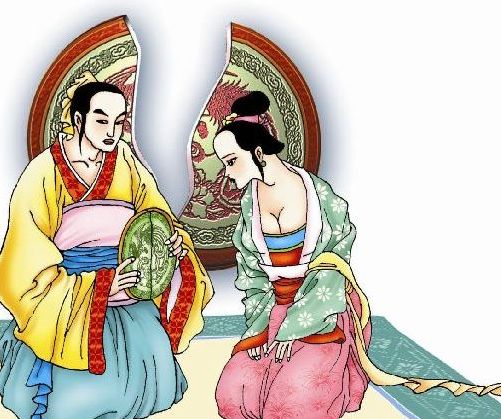??????? 
During the Southern and Northern Dynasties (420-589), in the state of Chen, there lived a beautiful, intelligent princess named Lechang. She and her husband, Xu Deyan, loved each other dearly. But before long, their country was in danger of being invaded by the troops of the Sui Dynasty (581-618). Princess Lechang and Xu Deyan had a premonition that their county would be occupied by the invaders, forcing them to leave the palace and go into exile. They might even be forced to separate and lose sight of one another. Thus, they broke a bronze mirror, a symbol of the unity between husband and wife, into two parts. Each kept a half of the mirror. They agreed that each would take their half of the mirror to the fair during the Lantern Festival (which falls on the 15th day of the first lunar month) the next year, in hopes that they would meet again.
Alas, their premonition soon came true. Amid the chaos of war, the princess lost touch with her husband and was taken to be a concubine of a powerful minister, Yang Su.
During the Lantern Festival the next year, Xu Deyan took his half of the mirror to the fair, hoping that he could see his wife again. It so happened that he came upon a servant who was selling the other half of the bronze mirror. Xu Deyan recognized it immediately and asked the servant about his wife. As he heard about her bitter experiences, tears rolled down his cheeks. Xu Deyan wrote a poem on the half of the mirror that was his wife's: "You left me with your broken mirror, now the mirror is back but you are not. I can no longer see your reflection in the mirror, I can only see the bright moon."
The servant then took the inscribed half of the mirror back to Princess Lechang. She cried for several days because she knew her husband was still alive and missed her, but they could never meet again.
When Yang Su heard of Princess Lechang's sadness, he was moved by their true love for one another and realized it was impossible for him to capture her love. Thus, he sent for Xu Deyan and allowed them to reunite.
From this story comes the idiom "a broken mirror joined together." It suggests the happy reunion of a separated couple.
pò jìng chóng yuán
破鏡重圓
?????? 南北朝時期,陳國公主樂昌美麗且有才華。她與丈夫徐德言感情深厚。但當(dāng)時,隋朝正入侵陳國,陳國即將滅亡。樂昌公主和徐德言都預(yù)感到他們的國家將被入侵者占領(lǐng),他們也會被迫離開王宮,背井離鄉(xiāng)。戰(zhàn)亂中,他們可能失去聯(lián)系。于是,他們將一枚象征夫妻的銅鏡一劈兩半,夫妻二人各藏半邊。相約在第二年正月十五元宵節(jié)那天,將各自的半片銅鏡拿到集市去賣,期盼能重逢。
?????? 不久,他們的預(yù)感就成為了現(xiàn)實。戰(zhàn)亂中,公主與丈夫失散了,并被送到隋朝一位很有權(quán)勢的大臣楊素家中,成了他的小妾。
?????? 在第二年的元宵節(jié)上,徐德言帶著他的半邊銅鏡來到集市上,渴望能遇見他的妻子。碰巧,有一名仆人正在賣半面的銅鏡。徐德言馬上認(rèn)出了這面鏡子。他向那名仆人打聽妻子的下落。當(dāng)他得知妻子的痛苦遭遇后,他不禁淚流滿面。他在妻子的那半面銅鏡上題了首詩:“鏡與人俱去,鏡歸人不歸。無復(fù)嫦娥影,空留明月輝。”
?????? 那個仆人把題了詩的銅鏡帶回來,交給了樂昌公主。一連幾天,她都終日以淚洗面,因為她知道丈夫還活著而且想念她,但他們卻無法再相見了。
?????? 楊素終于發(fā)現(xiàn)了這件事。他也被兩人的真情所打動,覺得自己也不可能贏得樂昌的愛。于是,他派人找來了徐德言,讓他們夫妻團圓了。
?????? “破鏡重圓”這個成語就是從這個故事來的。形容夫妻分開后,又高興的團圓。
ài bù shì sh?u
愛不釋手
to be so fond of something that one can hardly put it down; cannot tear oneself away from something; can scarcely take one's eyes off something